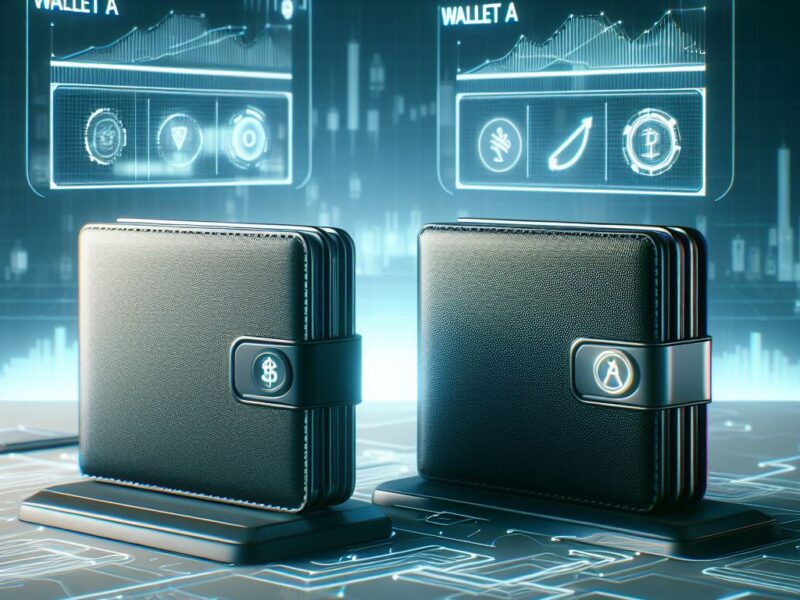In the storage of cryptocurrency, there’s a saying that goes, “not your keys, not your coins.” This is to emphasize the importance of security to your digital assets. Hence hardware wallets come into play. These physical devices offer solutions for safeguarding your precious crypto holdings. But like any technology, hardware wallets come with their own advantages and disadvantages.
In this short but relevant article, we carefully examined the advantages and disadvantages of using hardware wallets
Advantages of Hardware Wallets
1. Enhanced Security
One of the primary advantages of hardware wallets is their superior security compared to software wallets. Hardware wallets store your private keys offline, making them immune to online threats such as hacking, malware, and phishing attacks. The private keys never leave the device, adding extra protection. Most hardware wallets also feature a secure element chip, which is designed to resist tampering and unauthorized access. This makes hardware wallets an excellent choice for storing large amounts of cryptocurrency.
2. User Control
With hardware wallets, you have complete control over your private keys. Unlike keeping your funds on a centralized exchange, where you trust a third party to manage your assets, hardware wallets put you in the driver’s seat. You are the sole custodian of your private keys, reducing the risk of unauthorized access or loss due to exchange hacks or insolvency. This level of control aligns with the decentralized ethos of cryptocurrency, empowering users to be their own bank.
3. Convenience and Portability
Despite their large security features, hardware wallets are designed with user convenience in mind. They are compact and portable, allowing you to carry your digital assets wherever you go. Most hardware wallets are compatible with multiple cryptocurrencies, enabling you to manage diverse portfolios from a single device. The setup process is straightforward, and the accompanying software interfaces are user-friendly, making it easy for both beginners and experienced users to manage their funds securely.
4. Long-Term Storage
Hardware wallets are ideal for long-term storage of cryptocurrencies. If you plan to hold your digital assets for an extended period, keeping them offline in a hardware wallet minimizes the risk of loss due to online threats or technological obsolescence. Many hardware wallets are built to last, with durable materials and components that can withstand the test of time. Some models even offer additional features like backup and recovery mechanisms, ensuring that your funds remain accessible even if the device is lost or damaged.
Disadvantages of Hardware Wallets
1. Initial Cost
One potential drawback of hardware wallets is the initial cost of acquisition. While software wallets are often free, hardware wallets come with a price tag. Depending on the brand and model, prices can range from around $50 to over $200. For those new to cryptocurrency or dealing with smaller amounts, this upfront investment may seem daunting. However, it’s important to weigh the cost against the long-term security benefits and peace of mind that hardware wallets provide.
2. Limited Accessibility
Unlike software wallets that can be accessed from any internet-connected device, hardware wallets require physical access to the device itself. This can be inconvenient if you need to make frequent transactions or if you’re on the move without your hardware wallet readily available. In emergency situations where you need to access your funds quickly, the reliance on a physical device can be a hindrance.
Read also: Choosing the Right Crypto Wallet: Hot vs Cold Options
It’s crucial to strike a balance between security and accessibility based on your needs and usage patterns.
3. Potential for Physical Damage or Loss
Hardware wallets are physical devices, which means they can be damaged or lost. If your hardware wallet is lost, stolen, or destroyed, you risk losing access to your funds permanently. While most reputable hardware wallets offer backup and recovery features, such as seed phrases or recovery sheets, it’s essential to keep these backups secure and accessible. Failure to do so can result in the irreversible loss of your cryptocurrencies. It’s crucial to treat your hardware wallet and its backups with the utmost care and security.
4. Learning Curve
For those new to cryptocurrency, using a hardware wallet may involve a learning curve. While most hardware wallets strive for user-friendliness, there are still concepts and processes that may be unfamiliar to beginners. Understanding how to set up the device, manage multiple cryptocurrencies, and perform transactions securely can take some time and effort. It’s important to educate yourself thoroughly and follow best practices to ensure the security of your hardware wallet and the funds it holds.
Key Takeaways
- Hardware wallets provide enhanced security by storing private keys offline, protecting against online threats such as hacking and malware.
- With hardware wallets, users maintain full control over their private keys, aligning with the decentralized nature of cryptocurrencies.
- Despite their robust security, hardware wallets are designed for convenience and portability, making them suitable for managing diverse portfolios on the go.
- Hardware wallets are ideal for long-term storage of cryptocurrencies, with durable designs and backup mechanisms for added peace of mind.
- The initial cost of hardware wallets may be a consideration, but it should be weighed against the long-term security benefits they provide.
- Hardware wallets require physical access to the device, which can limit accessibility in certain situations compared to software wallets.
- As physical devices, hardware wallets are susceptible to damage, theft, or loss, emphasizing the importance of secure backup and recovery measures.
- Using a hardware wallet may involve a learning curve for beginners, requiring education and adherence to best practices for optimal security.
- When choosing a cryptocurrency storage solution, it’s crucial to assess individual needs, risk tolerance, and usage patterns to strike a balance between security and accessibility.
- Hardware wallets offer a proactive approach to securing digital assets, providing enhanced protection and user control in the rapidly evolving cryptocurrency landscape.
Frequently Asked Questions
1. What is a hardware wallet, and how does it differ from a software wallet?
A hardware wallet is a physical device designed to store cryptocurrency private keys offline, while a software wallet is a digital application that stores private keys on a computer or mobile device, potentially exposing them to online risks.
2. Are hardware wallets difficult to set up and use?
Hardware wallets may involve a slight learning curve, most reputable brands strive for user-friendliness. The setup process is generally straightforward, and the accompanying software interfaces are designed to be intuitive for both beginners and experienced users.
3. Can I store multiple cryptocurrencies on a single hardware wallet?
Yes, most hardware wallets support a wide range of cryptocurrencies, allowing you to manage diverse portfolios from a single device. However, it’s essential to check the specific supported currencies for the hardware wallet you choose.
4. What happens if I lose my hardware wallet or it gets damaged?
If your hardware wallet is lost, stolen, or damaged, you can still recover your funds using the backup mechanism provided by the wallet manufacturer. This typically involves a seed phrase or a recovery sheet that you must keep secure and accessible. It’s crucial to follow the manufacturer’s guidelines for backup and recovery.
5. Are hardware wallets immune to all types of attacks?
While hardware wallets provide a high level of security against online threats, they are not completely immune to all types of attacks. Physical attacks, such as tampering or side-channel attacks, are still possible, although rare. It’s essential to purchase hardware wallets from reputable manufacturers and follow best practices for secure usage and storage.
6. How much do hardware wallets cost, and are they worth the investment?
The cost of hardware wallets varies depending on the brand and model, ranging from around $50 to over $200. While the initial investment may seem high compared to free software wallets, the enhanced security and peace of mind provided by hardware wallets often make them a worthwhile investment for those with significant cryptocurrency holdings.
7. Can I use a hardware wallet for day-to-day transactions?
Hardware wallets are primarily designed for secure long-term storage of cryptocurrencies. While they can be used for day-to-day transactions, the need for physical access to the device may be less convenient compared to software wallets. It’s common to use a combination of hardware wallets for long-term storage and software wallets for more frequent transactions.
8. How do I choose the right hardware wallet for my needs?
When selecting a hardware wallet, consider factors such as the supported cryptocurrencies, ease of use, security features, reputation of the manufacturer, and compatibility with your devices. Research different options, read user reviews, and evaluate your specific requirements to make an informed decision.
9. Are there any additional steps I should take to secure my hardware wallet?
In addition to using a hardware wallet, it’s crucial to follow best practices for overall cryptocurrency security. This includes keeping your backup phrase or recovery sheet secure, using strong passwords, enabling two-factor authentication when available, and keeping your hardware wallet software updated. Regularly monitoring your accounts and being cautious of phishing attempts are also essential steps.
10. Can I use a hardware wallet in combination with other security measures?
Yes, hardware wallets can be used in conjunction with other security measures for added protection. For example, you can use a hardware wallet to store your long-term holdings while keeping a smaller portion of your funds in a software wallet for daily transactions. Additionally, utilizing a multisignature (multi-sig) setup, where multiple devices or parties are required to authorize transactions, can provide an extra layer of security for high-value accounts.










